

Study offers evidence of unconscious thinking impacting conscious decision making. (Medical Xpress)—A trio of researchers with the University of New South Wales, has found evidence to support the notion that unconscious thinking does impact conscious thinking, without the person even knowing it.
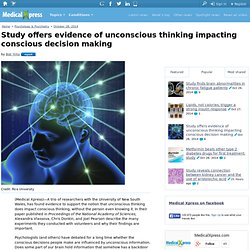
In their paper published in Proceedings of the National Academy of Sciences, Alexandra Vlassova, Chris Donkin, and Joel Pearson describe the many experiments they conducted with volunteers and why their findings are important. Buddhist Economics: How to Stop Prioritizing Goods Over People and Consumption Over Creative Activity. By Maria Popova “Work and leisure are complementary parts of the same living process and cannot be separated without destroying the joy of work and the bliss of leisure.”
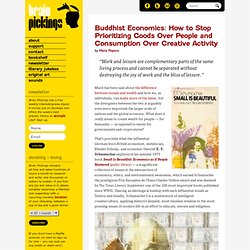
Much has been said about the difference between money and wealth and how we, as individuals, can make more of the latter, but the divergence between the two is arguably even more important the larger scale of nations and the global economy. “Yo peyote”: la búsqueda del espíritu en la era digital « Pijamasurf. A lo largo de la historia y en su búsqueda de lo trascendental, el ser humano ha entretejido innumerables rutas hacia probables destinos en donde florezcan respuestas fundamentales.
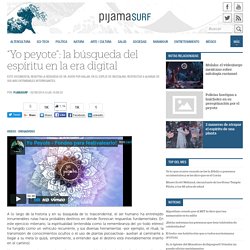
En este ejercicio milenario, la espiritualidad (entendida como la remembranza del yo-todo etéreo) ha fungido como un vehículo recurrente, y sus diversas herramientas -por ejemplo, el ritual, la transmisión de conocimientos ocultos o el uso de plantas psicoactivas- auxilian al caminante a llegar a su meta (o quizá, simplemente, a entender que el destino está inevitablemente inserto en el camino).
Yo peyote es un documental que ilustra esta arquetípica búsqueda. Atendiendo a ese llamado que, como crudo privilegio, desborda los cimientos de la existencia, Carlos Matiella, un joven artista mexicano, viaja a Wirikuta (la tierra sagrada de los wixarrika o huicholes) persiguiendo el sentido de su existencia. I Ching (many versions and commentaries) Taoism - Demonoid.
Chaos & Complexity Pdf Library > GaianXaos. The Neuroscience of Decision Making Explained in 30 Seconds - Wired Science. Is it possible to explain the neuroscience of decision making in 30 seconds?
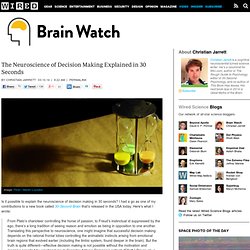
I had a go as one of my contributions to a new book called 30-Second Brain that’s released in the USA today. Here’s what I wrote: From Plato’s charioteer controlling the horse of passion, to Freud’s instinctual id suppressed by the ego, there’s a long tradition of seeing reason and emotion as being in opposition to one another. Translating this perspective to neuroscience, one might imagine that successful decision making depends on the rational frontal lobes controlling the animalistic instincts arising from emotional brain regions that evolved earlier (including the limbic system, found deeper in the brain).
Body Atlas Reveals Where We Feel Happiness and Shame. Yellow shows regions of increased sensation while blue areas represent decreased feeling in these composite images.
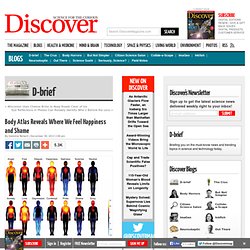
Image courtesy of Lauri Nummenmaa, Enrico Glerean, Riitta Hari, and Jari Hietanen. Chests puffing up with pride — and happiness felt head to toe — are sensations as real as they are universal. And now we can make an atlas of them. Researchers have long known that emotions are connected to a range of physiological changes, from nervous job candidates’ sweaty palms to the racing pulse that results from hearing a strange noise at night. Google's 'Jolly Good Fellow' On The Power Of Emotional Intelligence. Conférence : La réincarnation existe-t-elle ? Découvrez en avant-première exclusive le documentaire « La réincarnation » de la Saison 2 d’Enquêtes Extraordinaires réalisée par Natacha Calestrémé, qui sera diffusée tout l’été sur M6.La réincarnation existe-t-elle ?
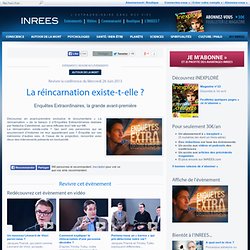
Qui sont ces personnes qui se souviennent d’histoires ne leur appartenant pas ? Des neuroscientifiques reconnaissent la conscience des mammifères et des oiseaux. Merci beaucoup à Stéphanie pour la traduction de cet article.
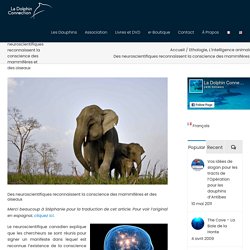
Pour voir l’original en espagnol, cliquez ici. Le neuroscientifique canadien explique que les chercheurs se sont réunis pour signer un manifeste dans lequel est reconnue l’existence de la conscience de tous les mammifères, oiseaux et autres créatures telles que le poulpe, et de quelle manière cette découverte pourrait impacter la société. Le neuroscientifique canadien Philip Low, a gagné la proéminence dans la presse scientifique, après avoir présenté un projet avec le physicien Stephen Hawking, âgé de70 ans.
Low veut aider Hawking, qui est complètement paramysé depuis 40 ans à cause d’une maladie dégénérative, et c’est pour cette raison qu’il ne peut communiquer que par l’esprit. Les résultats de l’étude ont été révélés samedi dernier lors d’une conférence à Cambridge. Philip Low : « Tous les mammifères et oiseaux ont une conscience. » Le journaliste : Quels animaux ont une conscience ? Consciousness. Think Global. South America. Spirituality. Pushing Humanity Forward.
Nikola Tesla The Secret Movie - Unlimited Free Energy Forever. Encyclopedia Britannica lists Nikola Tesla as one of the top ten most fascinating people in history.
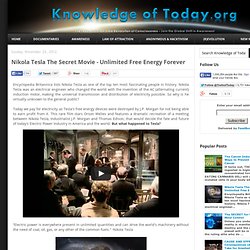
Nikola Tesla was an electrical engineer who changed the world with the invention of the AC (alternating current) induction motor, making the universal transmission and distribution of electricity possible. So why is he virtually unknown to the general public? Unraveling the mystery of consciousness. Antonio Damasio asks: How do we become conscious of the things around us?
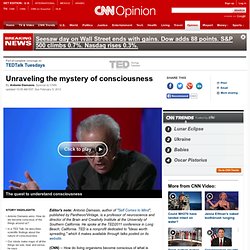
In a TED Talk, he describes scientific findings about the nature of consciousnessOur minds make maps of all the things we see, hear and sense, he saysDamasio: We need more than the maps; it takes a sense of self to be fully conscious Editor's note: Antonio Damasio, author of "Self Comes to Mind", published by Pantheon/Vintage, is a professor of neuroscience and director of the Brain and Creativity Institute at the University of Southern California. Main Stream Media. Collective Consciousness. Dr. Susan Blackmore. Qualia: The Inverted Spectrum. G83.3010 Consciousness, Action and Attention.
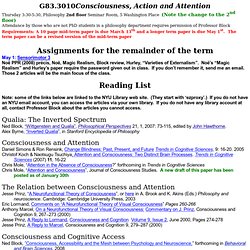
The Intention Experiment: Using Your Thoughts to Change Your Life and the World (9780743276955): Lynne McTaggart. What Are You Saying Between the Lines? Is Free Will an Illusion? - The Chronicle Review. Neuroscience, Philosophy and Consciousness - Connecting Hypnotherapy... Tergar Learning Community. Can your body sense future events without any external clue? Wouldn't it be amazing if our bodies prepared us for future events that could be very important to us, even if there's no clue about what those events will be? Presentiment without any external clues may, in fact, exist, according to new Northwestern University research that analyzes the results of 26 studies published between 1978 and 2010.
Researchers already know that our subconscious minds sometimes know more than our conscious minds. An interoceptive predictive coding model of conscious presence. Introduction In consciousness science, psychiatry, and virtual reality (VR), the concept of presence is used to refer to the subjective sense of reality of the world and of the self within the world (Metzinger, 2003; Sanchez-Vives and Slater, 2005).
A Case Study in Voodoo Genetics. A new review of published studies looking at the relationship between a gene and brain structure offers a sobering lesson in how science goes wrong. Dutch neuroscientists Marc Molendijk and colleagues took all of the studies that compared a particular variant, BDNF val66met, and the volume of the human hippocampus.
It's a long story, but there are various biological reasons that these two things might be correlated. It turns out that the first published reports found large genetic effects, but that ever since then, the size of the effects has dropped, with the latest studies finding no effects at all - Video.